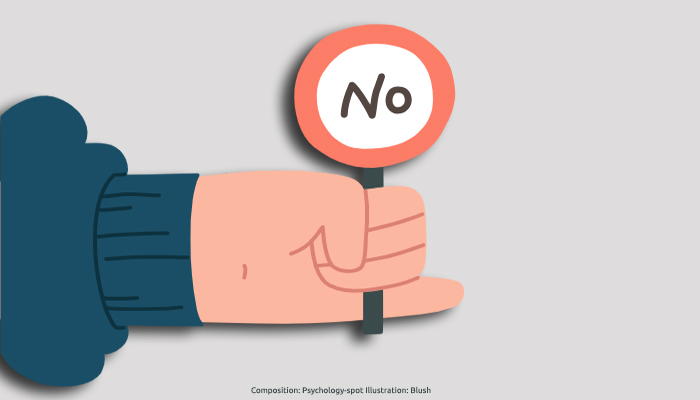
Maturity can be described in a thousand different ways. There are different characteristics and traits attributed to mature people. However, in this amalgam of qualities, a characteristic inextricably linked to emotional maturity stands out: self-affirmation.
Thanks to self-affirmation we acquire the security and serenity necessary to take charge of our life, accepting what we really want and rejecting everything that hurts us. For some, developing that level of self-knowledge and self-determination can take a lifetime.
The straitjacket of social pressure
There is a moment in life when we either free ourselves from fears and social pressures, or we end up living by their rules and allowing them to dictate our decisions. Social pressures – implicit and explicit – are many and come from everywhere.
Although they usually originate in the society to which we belong and the culture in which we are imbued, they are perpetuated and pressured by people around us, from our neighbors and coworkers to our friends, parents or partner.
Sometimes these pressures push us down paths that we would not have freely chosen. They tie us up with “you can’t” or “you don’t.” Those messages, repeated day after day, end up making a dent in us. We internalize them and they become norms that govern our behavior. We begin to tell ourselves “I can’t” or “I don’t.”
Thus we begin to stifle our most authentic desires and impulses, for fear of being questioned or even rejected. We adapt to the social roles that we must play to avoid disappointment on the faces of the others. However, by adapting so much to their standards and expectations, we may end up invalidating ourselves. We can end up silencing our inner dialogue or even depriving ourselves of the psychological oxygen to breathe.
Starting to remove all the layers that we have built to fit into the universe of the “others” involves an hard work of self-discovery. That path is full of obstacles, but it is also extremely liberating.
Embracing what we want to feel so good, finally
Most of us have been brought up in a culture that leads to extreme “burnout”. Continually seeking external approval to validate ourselves implies devoting an enormous amount of psychological energy to interpreting all these social roles, which ends up draining us and distancing ourselves from our “self”.
Only when we begin to distance ourselves from these social roles and shed the “must” and “have”, we can reconnect with our deepest “self” and discover what we really want. This new maturity is deeply liberating, it allows us to realize that we don’t need to prove anything to anyone except ourselves. We understand that when we say “enough,” we are actually respecting our wishes and honoring our aspirations. Then we can say “yes” without fear and “no” without guilt.
However, this process of personal rediscovery can have a “dark” side if we do not know how to manage it properly. Some people, when they discover the life of “social submission” that they have led, may react by becoming angry and harboring a grudge against the “others.” These feelings can lead them to the opposite extreme, moving from extreme complacency to selfishness.
The key to saying “no” without guilt or charges of conscience lies in being able to assert ourselves without attacking. It means standing up for our assertive rights while respecting the rights of the others. It means preserving empathy, but saying no to manipulation.
The reaffirmation of our goals, aspirations or desires has nothing to do with selfishness, it is an act of personal dignity. It is an exercise in psychological survival and well-being. In fact, the research in Psychology has found that assertive people not only experience less stress, but are in better health and less prejudiced towards the others.
We need to understand that saying “no” when the others expect a “yes” is not an act of betrayal for which we should feel bad, but an act of personal reassurance. Whoever loves us will know how to respect those limits and will even feel happy for us. Whoever feels betrayed and hurt is likely to want us to keep putting hiso r her needs and desires ahead of ours.
When we meet ourselves again, we will finally realize all the superfluous things that were drowning us. The mental noise that prevented us from thinking clearly. The obstacles that we put to prevent ourselves from flying. Then we can spread our wings and say “yes” to what we really want and “no” to everything that hurts us. Without fears. Without guilt. No regrets.
Sources:
Badea, C. & Sherman, D. K. (2018) Self-Affirmation and Prejudice Reduction: When and Why? Current Directions in Psychological Science; 28: 40-46.
Cohen, G. L. & Sherman, D. K. (2014) The Psychology of Change: Self-Affirmation and Social Psychological Intervention. Annual Review of Psychology; 65(1): 333-371.
Creswell, J. D. et. Al. (2005) Affirmation of Personal Values Buffers Neuroendocrine and Psychological Stress Responses. Psychol Sci; 16(11): 846-851.
Correl, J. et. Al. (2004) An affirmed self and an open mind: Self-affirmation and sensitivity to argument strength. Journal of Experimental Social Psychology; 40(3): 350-356.



